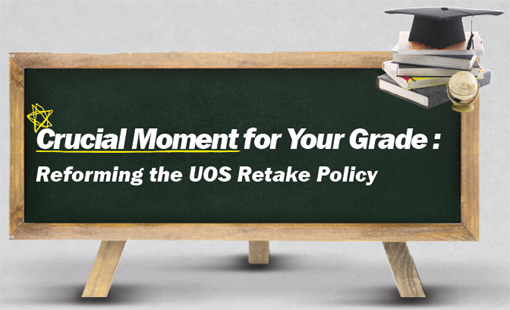


“It is unfair for these students to get an A+ ,” Lee said. “I tried harder than they did the first time. Now, the only advantage I have is that I graduate more quickly.”
Early this year, it came like a bolt from the blue for many students when they heard that the administration was amending the GRP. They began debating the pros and cons. Some of them reacted strongly against the revision, while others welcomed it. Imagining two typical opposing views, hypothetical students with different interests, look at the left page.

By the way, why is the administration trying to reform the policy? What do students think about it? The UOS Times tries to find the answers to both questions.
Here is what the GRP currently says:

Despite these issues, the number of UOS graduates who have earned a grade point average (GPA) of higher than 3.5 in 2014 provides a surprising result. According to the data published by Higher Education in Korea (Daehak Alimi), of the top 15 universities in Seoul in 2014, the HUFS ranked number one for the ratio of graduates with higher than 3.5 GPA. It accounted for 68.4 percent. The UOS represented 41.8 percent, and the CAU took up 31.9 percent, ranked the lowest. This difference of 26.6 percent between the HUFS and the UOS shows that the UOS is not severely overflowing with high-scoring graduates, even with more moderate GRP systems when compared to universities. Despite this, the UOS finally suggested a plan to intensify its EMS including modifying the GRP in the first semester of 2015.
The issues surrounding the GRP are arousing UOS students’ worries over grades and finding jobs. If this amendment is executed, the average GPA of UOS graduates will be lower. Students may face disadvantages in the job market, as employers disregard resumes showing lower GPAs. From student’s point of view, this issue is a sensitive matter directly connected to them.
Why has the UOS decided to revise the GRP?
This issue began on Jan. 29, 2014, when the Ministry of Education released a Restructuring Plan for Universities (RPU). The RPU is a structural reform of the education system that relies on evaluation of institutional operations and school curricula. One goal of the RPU is to enhance the competence among universities in Korea. There are some reasons for devising this plan: reinforcing the fairness of university assessments, reducing entrance quotas for students, weeding out underperforming universities to reduce the oversupply of schools, and cultivate a better educational environment. Under the plan, the government will use the results of its assessments in determining financial support and setting the maximum number of students for universities. Among evaluation indicators, there is a category called “Intensifying Credit Management,” which includes an “operation system for strict grading.” Schools are now making their GRPs a priority as they adjust their policies. To follow this government plan, the UOS administration also felt it was necessary to improve its GRP scheme, even though staffs of the administration said the current GRP had virtually no structural problem.
Over the past few years, several universities have also reformed their GRPs under the issue of the RPU. Here are a few examples of how universities have adjusted their policies:
At Seoul National University, students can retake courses if they earn a grade lower than C+. Retake grades are limited to A0. A transcript indicates whether a course has been retaken or not.
Sogang University allows retaking of a course if the grade is lower than C0. It cannot be higher than A- when retaken. Moreover, retaken courses are marked on the transcript. Students can register for a class that they want to retake at any time during the period of enrollment. However, they can only retake one class in a semester. A student who has been placed on academic probation in the previous semester may retake two classes.
The CAU will enforce its new policy in 2016. Students will be allowed to retake classes only if they have received a grade of F, and the highest grade that students can attain when retaking will change from A0 to B+. In addition, there will be a limit in the number of retakes - three times - and a “Retake” mark will be displayed on grade reports.
The UOS has not reformed its policy yet, but the Office of Academic Affairs proposed revisions at the beginning of the 2015 spring term. In that proposal, they lowered the possible grade for a retake from B0 to C+. They also decreased the grade that retaking students can receive to A0. Retaken courses would also be displayed with an “R” (standing for retake) in the transcript if these revisions are implemented. The period of registration for retaking courses will be assigned separately to a later date.
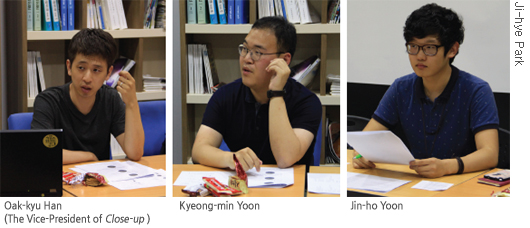
The UOS Times also conducted a survey to figure out student opinions about the GRP. In addition to this, The UOS Times held a discussion with three respondents to hear their own opinions about the GRP and the survey results. Here is the discussion:
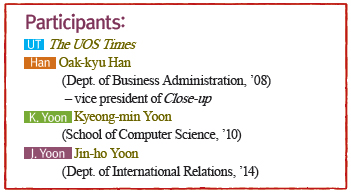
 Thanks for coming! First, let’s talk about the survey that The UOS Times conducted.
Thanks for coming! First, let’s talk about the survey that The UOS Times conducted.
Look at Q1. 83.4 percent of respondents think that the number of retaking students should decrease. Yes, it should. I think repairing this problem is the proper direction of the GRP. There is a drift towards increasing the number of retaking students because of pressure for getting higher grades. First-time takers are suffering from this pressure, and we are making a vicious cycle.
Yes, it should. I think repairing this problem is the proper direction of the GRP. There is a drift towards increasing the number of retaking students because of pressure for getting higher grades. First-time takers are suffering from this pressure, and we are making a vicious cycle. I do not agree with that. The UOS is already rather strict in grading, so we can be relatively disadvantaged compared with students of other universities in such areas as finding jobs.
I do not agree with that. The UOS is already rather strict in grading, so we can be relatively disadvantaged compared with students of other universities in such areas as finding jobs. I think the GRP is not the only reason for “grade inflation.” Grade quotas might be another reason. Anyway, if we do not consider grade quotas but only the GRP, we can see that revision is necessary.
I think the GRP is not the only reason for “grade inflation.” Grade quotas might be another reason. Anyway, if we do not consider grade quotas but only the GRP, we can see that revision is necessary. Let us continue to talk about Q2. The revised GRP will possibly lower the grades when students retake courses. Then, is it effective if they reduce the number of retaking students?
Let us continue to talk about Q2. The revised GRP will possibly lower the grades when students retake courses. Then, is it effective if they reduce the number of retaking students? It will be effective, of course. When there are only first-time takers in one class, a maximum of 15 percent can receive B0.
It will be effective, of course. When there are only first-time takers in one class, a maximum of 15 percent can receive B0.  According to the UOS policy, the rate of students who receive below C+ should be at least 30 percent, and no more than 50 percent should receive more than B+. It follows that no more than 20 percent can receive B0. Among these 20 percent of students, some would decide to retake the courses, but the number will decrease anyway.
According to the UOS policy, the rate of students who receive below C+ should be at least 30 percent, and no more than 50 percent should receive more than B+. It follows that no more than 20 percent can receive B0. Among these 20 percent of students, some would decide to retake the courses, but the number will decrease anyway. I also think so. However, the GRP is more disadvantageous to first-time takers than grade inflation is. We should ask whether the GRP can reduce these disadvantages rather than reducing the number of retakers.
I also think so. However, the GRP is more disadvantageous to first-time takers than grade inflation is. We should ask whether the GRP can reduce these disadvantages rather than reducing the number of retakers.
 Let’s move on to Q3. More than 90 percent of respondents said that they are not concerned about whether retaken courses are marked with “R” on their transcripts.
Let’s move on to Q3. More than 90 percent of respondents said that they are not concerned about whether retaken courses are marked with “R” on their transcripts.  Usually, students retake freshman and sophomore classes. Job interviewers will know whether applicants retook courses or not, because basic subjects such as “Presentation and Discussion” are not for seniors. I think it would make no difference.
Usually, students retake freshman and sophomore classes. Job interviewers will know whether applicants retook courses or not, because basic subjects such as “Presentation and Discussion” are not for seniors. I think it would make no difference.  Close-up did not include questions about this, because it was one of the guidelines from the Ministry of Education. A manager from the department of human resources in a company said what is the matter was not how many courses an applicant has retaken, but the final grades. However, if this policy goes through, retaken courses will be recognized in the transcript even though students resist.
Close-up did not include questions about this, because it was one of the guidelines from the Ministry of Education. A manager from the department of human resources in a company said what is the matter was not how many courses an applicant has retaken, but the final grades. However, if this policy goes through, retaken courses will be recognized in the transcript even though students resist. If it raises the credibility of our grades, it would be better to indicate with an “R.” Yet, as Han said, companies just check final grades, not specifically how they were earned, and they may not think it makes the EMS more reliable.
If it raises the credibility of our grades, it would be better to indicate with an “R.” Yet, as Han said, companies just check final grades, not specifically how they were earned, and they may not think it makes the EMS more reliable. On the contrary, the department of human resources should raise questions, looking a large number of retakers in a transcript.
On the contrary, the department of human resources should raise questions, looking a large number of retakers in a transcript.
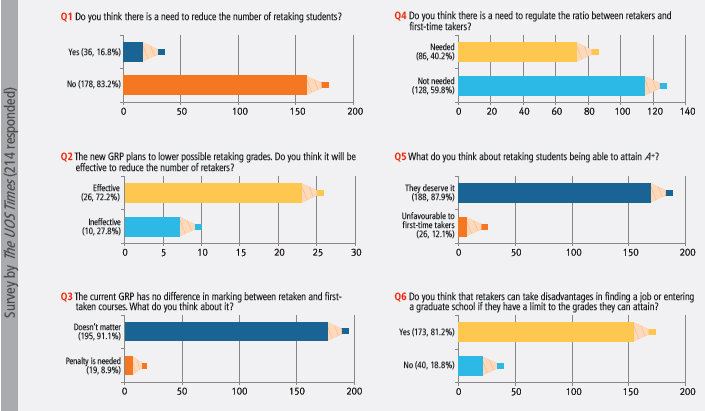
 How about Q4? The proportion of pros and cons made no big differences.
How about Q4? The proportion of pros and cons made no big differences. The School of Computer Science started regulating the ratio of the numbers of retakers to that of first-time takers in the autumn semester 2014 to help the first-time takers. As a result, first-time takers felt a little less discouraged, and their grades improved. However, the revisions in the School of Computer Science do not reflect what may happen to the entire university.
The School of Computer Science started regulating the ratio of the numbers of retakers to that of first-time takers in the autumn semester 2014 to help the first-time takers. As a result, first-time takers felt a little less discouraged, and their grades improved. However, the revisions in the School of Computer Science do not reflect what may happen to the entire university. Our department is also making its own regulations, and I think this is necessary. There are some cases of sophomores who cannot take their major classes because of retaking students. The revised GRP does not need to be so strict, but changes are needed.
Our department is also making its own regulations, and I think this is necessary. There are some cases of sophomores who cannot take their major classes because of retaking students. The revised GRP does not need to be so strict, but changes are needed.
 As you can see Q5, almost 90 percent of students said their grades depend on how hard they study for class.
As you can see Q5, almost 90 percent of students said their grades depend on how hard they study for class. We can say there are two major issues concerning revising the GRP. One is lowering the grade to qualify for a retake, and the other is limiting the grade that retaking students can earn. Students are more opposed to the latter, and Close-up will try to express this opposition strongly. On the other hand, if we should choose only one change, we may opt for the first one.
We can say there are two major issues concerning revising the GRP. One is lowering the grade to qualify for a retake, and the other is limiting the grade that retaking students can earn. Students are more opposed to the latter, and Close-up will try to express this opposition strongly. On the other hand, if we should choose only one change, we may opt for the first one. The present GRP does have a negative effect on a student’s sense of accomplishment.
The present GRP does have a negative effect on a student’s sense of accomplishment. Some professors penalize retaking students in their own willing. Should we consider this to be the professor’s discretion?
Some professors penalize retaking students in their own willing. Should we consider this to be the professor’s discretion? We should leave it to professors. They should give a grade of A+ to those who are outstanding, but otherwise, they can consider whether to give a grade of A+ or A0, and retaking can be one of the factors for them to consider.
We should leave it to professors. They should give a grade of A+ to those who are outstanding, but otherwise, they can consider whether to give a grade of A+ or A0, and retaking can be one of the factors for them to consider. It might be easier to retake a course. Some professors may assume that it will be easier and more beneficial for retakers.
It might be easier to retake a course. Some professors may assume that it will be easier and more beneficial for retakers.
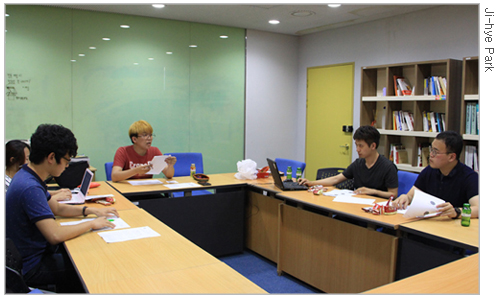
 Q6 can be a sensitive issue to students. Is it going to be a disadvantage when finding a job or entering a graduate school if there is a limit to the grade that retakers can acquire?
Q6 can be a sensitive issue to students. Is it going to be a disadvantage when finding a job or entering a graduate school if there is a limit to the grade that retakers can acquire? Yes, it will. I’ve heard some students say jokingly, “We can get better grades if we go to other universities!” The UOS is too strict in grading. Generally, human resource departments place a lot of weight on grades, and this reality may lead to disadvantages.
Yes, it will. I’ve heard some students say jokingly, “We can get better grades if we go to other universities!” The UOS is too strict in grading. Generally, human resource departments place a lot of weight on grades, and this reality may lead to disadvantages.  In addition, I do not think revisions to the GRP will help our school meet the criteria of thorough grade management [as required in the RPU].
In addition, I do not think revisions to the GRP will help our school meet the criteria of thorough grade management [as required in the RPU].
 Finally, we have come to Q7. There are several drawbacks in the current GRP, and students agreed about this.
Finally, we have come to Q7. There are several drawbacks in the current GRP, and students agreed about this. Negligence in class may be the result from the high ratio between retaking students and first-time takers. First-time takers may easily fall into negligence in classes where they see a lot of retakers.
Negligence in class may be the result from the high ratio between retaking students and first-time takers. First-time takers may easily fall into negligence in classes where they see a lot of retakers. I agree with that. Professors may be disappointed with the lack of tenacity in classes with a higher number of retaking students.
I agree with that. Professors may be disappointed with the lack of tenacity in classes with a higher number of retaking students.
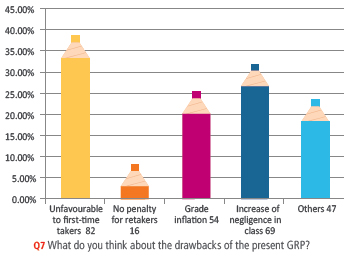
After a short break, we discussed how the UOS administration would take student opinions into consideration. We also discussed the current state of the GRP.
 Now, let’s talk about how the school should reflect students’ opinions in the revision process.
Now, let’s talk about how the school should reflect students’ opinions in the revision process.  Close-up compiled opinions from students and faculty in every department and submitted them to the administration on June 30. We are waiting for their answer now. This is the first time the office of Academic Affairs collaborated with Close-up, and I’m not sure what the results will be. A department opinion reflects the voice of professors, so I expect invalidation of revision will hardly happen. And I am also worried about whether Close-up has fully reflected students’ views.
Close-up compiled opinions from students and faculty in every department and submitted them to the administration on June 30. We are waiting for their answer now. This is the first time the office of Academic Affairs collaborated with Close-up, and I’m not sure what the results will be. A department opinion reflects the voice of professors, so I expect invalidation of revision will hardly happen. And I am also worried about whether Close-up has fully reflected students’ views. What about the plan to apply the revision retroactively?
What about the plan to apply the revision retroactively? If Close-up cannot stop this amendment, we will at least request for a delay of its implementation from 2016 to 2017. The retroactive application will be probably enforced to all students, not only to freshmen.
If Close-up cannot stop this amendment, we will at least request for a delay of its implementation from 2016 to 2017. The retroactive application will be probably enforced to all students, not only to freshmen. Many students worry about how to deal with the low grades they have received. Does Close-up have any plan to solve these problems?
Many students worry about how to deal with the low grades they have received. Does Close-up have any plan to solve these problems? It depends on how we discuss with the school. However, if the administration acts unilaterally, we will strongly express our opinions. The General Student Assembly will be held in September.
It depends on how we discuss with the school. However, if the administration acts unilaterally, we will strongly express our opinions. The General Student Assembly will be held in September. Many other universities are currently revising their GRPs. Do you think the UOS needs to make a change to follow these?
Many other universities are currently revising their GRPs. Do you think the UOS needs to make a change to follow these? I think the UOS already has an optimal system. With the RPU’s vague criteria, a revised GRP could just result in losses for UOS students.
I think the UOS already has an optimal system. With the RPU’s vague criteria, a revised GRP could just result in losses for UOS students.  On the other hand, school faculty cannot help but consider the RPU, because it matters a lot in the development of the UOS. In previous years, the UOS has had difficulty gaining acceptance in the Advancement of College Education (ACE) program, and the school became more sensitive about improving. Close-up considers the voice of the students to be a priority, but it has always been difficult to come up with real solutions that will also benefit the students.
On the other hand, school faculty cannot help but consider the RPU, because it matters a lot in the development of the UOS. In previous years, the UOS has had difficulty gaining acceptance in the Advancement of College Education (ACE) program, and the school became more sensitive about improving. Close-up considers the voice of the students to be a priority, but it has always been difficult to come up with real solutions that will also benefit the students.  We need to discuss the issue of grade inflation as a social matter. Do you have any opinions about this?
We need to discuss the issue of grade inflation as a social matter. Do you have any opinions about this? I think this problem is more related to professors’ attitudes, not regulation. Professors’ main duty includes research and lecture. If they put as much effort on meeting these commitments as they do on supervising a stricter EMS, the students’ tendency to retake courses will be alleviated.
I think this problem is more related to professors’ attitudes, not regulation. Professors’ main duty includes research and lecture. If they put as much effort on meeting these commitments as they do on supervising a stricter EMS, the students’ tendency to retake courses will be alleviated.  This may sound like a fantasy, but I think this problem originated from representing the university as a job training institution. The Ministry of Education does not perform its role of nurturing authentic talent, but instead, it just lines up universities around the country and assesses them. This emphasis is against the universities’ reason for being.
This may sound like a fantasy, but I think this problem originated from representing the university as a job training institution. The Ministry of Education does not perform its role of nurturing authentic talent, but instead, it just lines up universities around the country and assesses them. This emphasis is against the universities’ reason for being. I agree with you. It seems ironic that the school and its students are in conflict, and this all began from the plan of the Ministry of Education. The problem arises because of the concerns about grades being evaluated through the RPU. I think it is wrong to evaluate all universities with the same standardized indices.
I agree with you. It seems ironic that the school and its students are in conflict, and this all began from the plan of the Ministry of Education. The problem arises because of the concerns about grades being evaluated through the RPU. I think it is wrong to evaluate all universities with the same standardized indices. Current conflicts all come from one fundamental cause: social contradiction. It is a shame that we cannot deal with it in reality.
Current conflicts all come from one fundamental cause: social contradiction. It is a shame that we cannot deal with it in reality.

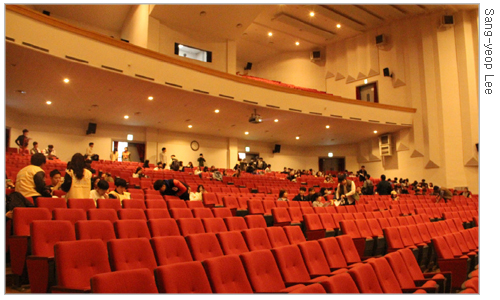
Ending a discussion, Han added, “Considering the situation of other universities and the government’s movements, the reformation seems to be inevitable. I recommend that you retake courses as soon as possible.”
The final form of the revision is not the only important factor in achieving the best policy; the revision process needs to include a coordination of opinions among students. We can find many examples to show us what happens in the absence of communication. One such example occurred at the HUFS in Dec. 2014. The HUFS administration simply sent an e-mail to students in order to notify them of changes in the evaluation system, but without any prior notice or time for discussion; modifying into the relative evaluation method and applying the changes retroactively from the second semester of 2014. The students protested against the administration’s unilateral action and applied for an injunction against the revision. Thus, an excessive alteration that the school tried to make resulted in an actual legal conflict.
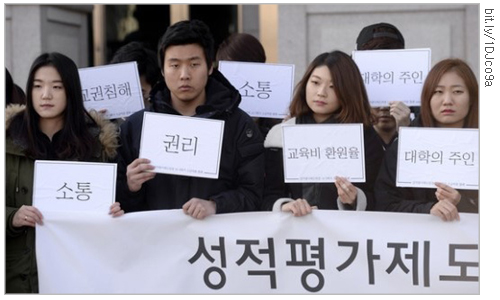
Sang-yeop Lee
syl0616@uos.ac.kr
Hye-joon Suh
hjsuh789@uos.ac.kr

